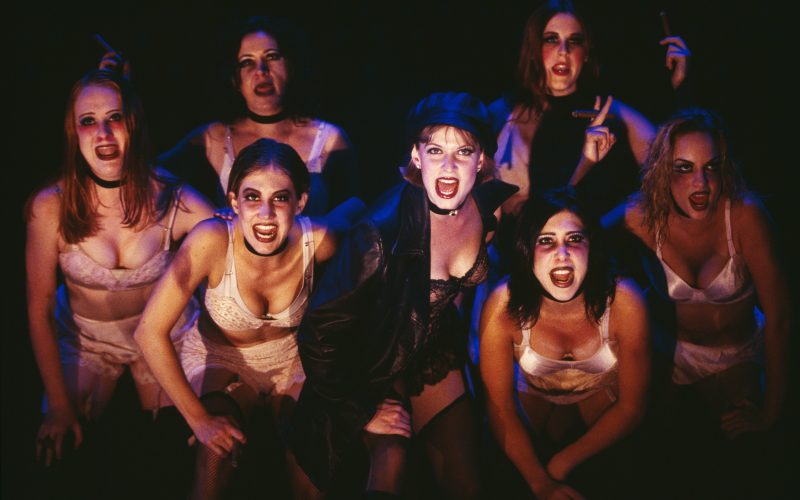Show remains challenging, contemporary
By: Jocelyn Murphy
I saw “Cabaret” for the first time last night as it opened at the Walton Arts Center. Never seen the movie, never seen any clips or heard any of the music — besides Liza Minelli’s performance of the title song. And I’ve got to say, it was probably the most challenging piece of theater I’ve seen. Perhaps that makes me sound sheltered, but it is what it is. I’ve seen what I feel to be a fair amount of Broadway musicals. But I’ll admit I don’t venture often to stories that seek to challenge and shock their audiences, asking you to examine your beliefs, your society or your morality. “Cabaret” does all of the above with disturbing applicability to the present. What made it all the more difficult and sometimes frustrating, though, is some of the commentary and metaphor was over my head, just out of reach.
The show begins in 1929 Berlin in the seedy Kit Kat Klub as the cabaret’s grungy, scantily-clad girls (is that makeup on their skin, or bruises?) limber up on stage while the audience is still settling in. Erik Schneider’s playful, flirtatious, salacious Emcee welcomes the audience — “Willkommen” — with his sometimes incomprehensible accent. But that’s OK; the words he’s saying are secondary to his over-the-top interactions with the ensemble — all raunchy jokes and innuendo. We’re also introduced to the full orchestra, made up of the ensemble themselves, whose onstage presence on the raised bandstand (up a spiral staircase, above the set of the club) impressed and delighted last night’s audience throughout the show.
The first act swirls through the hyper-sexuality of the Kit Kat members; the new relationship between self-absorbed star Sally Bowles (Bailey McCall Thomas) and naive American novelist Cliff Bradshaw (Carl Pariso); and the doomed romance of Bradshaw’s German landlord Fräulein Schneider (Audrey Federici) and the Jewish Herr Schultz (Fred Frabotta) in a flurry of scintillating visuals, unbridled sexuality, and glimpses of the darkness festering just under the surface. The performances are all believable and stirring, none of the accents distracting (even the Emcee — it just feels like part of his persona), and the chemistry between characters (or lack-of) plays an interesting role in foreshadowing where each interaction or relationship will end up.
As I mentioned, there are a few moments, a few numbers I could tell something deeper was being said but I didn’t know what. It all starts to come together in the Act I finale, though, as the rise of the Nazi party and its implications for the characters is further illuminated. The second act has the feel of spiraling out of control as the freedom of the cabaret’s world unravels. The archetypes each character represents become clearer as we watch them grapple, or further ignore, the reality of the turmoil around them — culminating in Thomas’ almost deranged rendition of the titular song.
“Cabaret” is a difficult and jarring watch — thanks to the content, as well as a few strange moments that leave you wondering how they fit into the narrative. By the end, the message is there, but it feels like it’s only scratched the surface. I’ll admit it was only after reading some analysis of the work (yes, it drove me to do that) that I fully grasped the deeper, and completely terrifying, significance of the themes and their continued relevance. Sure, in the face of rising Nazi power, the audience knows what is coming for the gay club members, the sexually liberated women and the optimistic Jewish man in spite of the characters’ denial. But when you consider the depiction of how normal, everyday Germans were seduced by the propaganda of a political party with promises to rescue their beloved homeland from economic turmoil, and return it to its former glory — a campaign centered around their religious and homosexual scapegoats — well, the Kit Kat Klub and its fate becomes all the more frightening.
It’s a show you’ll be discussing out in the lobby, or the whole way home. The complex characters — particularly Bowles and the Emcee — will stick with you as you replay their experiences and try to interpret their layered performances. But like most good art, on top of the contemplation and the interpretation the content asks of you, “Cabaret” also offers real entertainment with its catchy songs, laughs, captivating visuals and musical talent.



